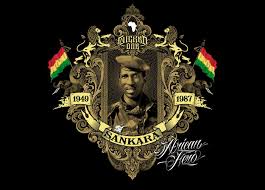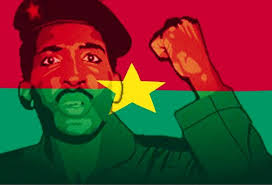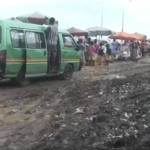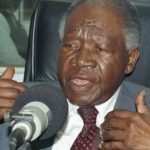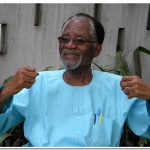Burkina Faso: The Revolution was not televised.
Posted by By Akogun Akomolafe at 6 December, at 10 : 46 AM Print
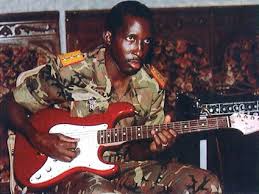
Warning: count(): Parameter must be an array or an object that implements Countable in /home/alaye/public_html/wp-content/themes/Video/single_blog.php on line 56
Burkina Faso: The Revolution was not televised.
For years experts will struggle to unravel the secrets of what made it possible for one of Africa’s longest-serving and wiliest of leaders to be toppled from power in few short days of protest by ordinary people. They also will struggle to unravel how, twenty seven years after his death, the ideas of a man could embolden a people to topple a powerful dictator.
When Burkinabes began to agitate on the 24th of October their president, Blaise Compaoré, must have dismissed them as the normal rabble-rousers he had so expertly dealt with during his 27 long years as Burkina Faso Maximum Leader. Even as the crowd swelled on the second day of protest, he must have thought he could still pull some tricks from the magic bag that has kept him in power since he killed his closest friend, Thomas Sankara, on October 15, 1987 and assumed power.
He was wrong. Unrelenting pressures forced his friends in Paris to help evacuate him to neighboring La Cote d’Ivoire.
October the 30th must be a day Compaoré will rue until he drew his last breath as the ultimate schemer finally ran of tricks, and was toppled from the power he so much cherished. It was an ignominious end to an inglorious rule by a man universally-loathed across Africa as the murderer of the Charismatic, fiercely-anti-imperialist, Revolutionary Thomas Sankara.
Historical Background
Burkina Faso, formerly known as Upper Volta, was cobbled together from the empire of Mossi and other kingdoms by the French during the European colonial project in Africa. Known as warriors of great repute, the Mossis fought tenaciously until French capture their capital, Ouagadougou in 1896. In 1919, the land was joined together with certain provinces from Ivory Coast and formed into the French Upper Volta in the French West Africa federation.
Upper Volta became an autonomous republic in the French community on December 11, 1958. Full independence came on July 11, 1960.
Brutally exploited by French Colonisers, a succession of corrupt civilian and military rulers, all beholden to French Interests, kept the country mired in poverty. Upper Volta was a postmark for underdevelopment and backwardness. An American diplomat derided the erstwhile Soviet Union as the Upper Volta with Nuclear Weapons. The brutal exploitation of the country and its people continue until Thomas Sankara took over in 1983.
Enter Sankara
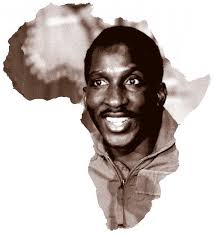 Captain Thomas Sankara was the Prime Minister in the military junta headed by Major Dr. Jean-Baptiste Ouédraogo of the Council of Popular Salvation (CSP). Factional infighting erupted within the CSP and Sankara was arrested and put in jail. His friend, Captain Blaise Compaoré, led his troops to effect his release and organize a successful military coup d’état on August 4, 1983. Sankara became president.
Captain Thomas Sankara was the Prime Minister in the military junta headed by Major Dr. Jean-Baptiste Ouédraogo of the Council of Popular Salvation (CSP). Factional infighting erupted within the CSP and Sankara was arrested and put in jail. His friend, Captain Blaise Compaoré, led his troops to effect his release and organize a successful military coup d’état on August 4, 1983. Sankara became president.
Sankara formed the National Council for the Revolution (CNR and also established Committees for the Defense of the Revolution (CDRs) to “mobilize the masses” and implement the CNR’s revolutionary programmes.
Sankara was a charismatic leader who matched his fiery Marxist rhetoric with practical examples and deeds to transform his feudal Upper Volta into a progressive and modern state. He launched several ambitious programmes that sought to make the country proud, self-reliant and self-confident.
He defined his ambition thus: “Refusing [to accept] a state of mere survival…freeing the countryside from medieval immobility…establishing democracy, opening people’s minds…so that they dare invent the future. Breaking the stranglehold of the bureaucracy…by changing the image of the public official… and putting our army among the people through productive work”.
His goal was to eliminate corruption and end the domination by France. To symbolize the new era, Sankara renamed the country to Burkina Faso (“Land of Incorruptible People”) and launched the most revolutionary and ambitious programmes for social and economic transformation not seen on the African continent since Kwame Nkrumah.
Disdaining foreignaid, Sankara cut off ties with the International Monetary Fund (IMF) and the World Bank and refused to accept foreign aid. He told his people that “He who feeds you control you.”
He called for the cancellation or repudiation of the odious debt crippling Africa. Believing that no one can prosper if he did not own his own resources, Sankara nationalised all land and mineral wealth. His regime gave priority to education and launched a nation-wide literacy campaign that saw many Burkinabes attending schools for the first time in their lives. School attendance doubled in the first two years of his government. His public health programme saw to the vaccination of 2.5 million children against meningitis, yellow fever and measles. His government was one of the first governments to publicly recognize the HIV epidemic as a serious health threat and responded accordingly.
Under the programme to “tie the nation together,” he launched ambitious road and rail construction projects. To halt the growing desertification of the Sahel, Sankara oversaw the planting over ten million trees. He doubled his country’s wheat production by redistributing land from feudal landlords to peasants. He abolished rural poll taxes and domestic rents. He encouraged every village to build a medical dispensary, and had over 350 communities construct their own schools using their own labour.
Sankara’s commitment to women’s rights was far ahead of his time. His government banned female genital mutilation and forced marriages. And for the first time, Burkinabe women were allowed to initiate divorce. Sankara actively sought out women to serve in his cabinet and in the army. Girls were made to stay in school and study even if pregnant. The position of women improved remarkably under his four year rule. He proclaimed: ”The revolution and women’s liberation go together. We do not talk of women’s emancipation as an act of charity or because of a surge of human compassion. It is a basic necessity for the triumph of the revolution.”
Thomas Sankara disdain any form of ostentation. He sold off luxurious government vehicles and he and his officials use the cheapest Peugeot available on the market. He slashed his salary to just $450 a month and biked to his office. He was an incorruptible leader in a continent besmirched by gargantuan corruption. Sankara’s total assets at the time of his death consisted of a house on which he was still paying the mortgage, $350 in the bank and few bikes.
Sankara told his people that: “Democratisation meant utilising the “full potential of the people. The ballot box and the electoral system [are insufficient]. There can be no democracy unless power in all its forms-economic, military, political, social and cultural-is in the hands of the people. Our revolution will be of value only if we are able to say…that the Burkinabe people are a little happier because of it. This required clean drinking water, enough to eat, decent housing, better clothing and education. Revolution meant happiness.”
To wean his country from foreign dependency, Sankara tried to create an industrial economy that will use the country’s raw materials. He led by example in encouraging civil servants to wear locally made clothes to office. His programmes were hugely successful as in four years of his rule, Burkina Faso was self-sufficient in food requirements.
All these revolutionary programmes made Sankara a potent icon to the African masses. But as usual, they also won him the eternal enmity of the local vested interests which included the nascent Burkinabé middle class and the feudal leaders he stripped of their hereditary right to forced labour and tribute exacted from the peasants. They also won him the everlasting hatred of France and its lackeys in Africa, especially the leader of Ivory Coast.
On October 15, 1987 Sankara was assassinated in a coup led by his friend, Compaoré. It was believed that the young Marxist ruler ruffled the feathers of the French and the Americans so much that they financed his overthrow with the complicity of Félix Houphouët-Boigny, affectionately called Papa Houphouët or Le Vieux, the then ruler of La Cote d’Ivoire.
Ironically, Sankara considered Compaoré a close friend and thought of him as: “highly intelligent and sensitive man.” He reportedly said of him: “It’s good to have a man in whom you can have total or almost total confidence”.
It appeared that Sankara had premonition about his death as a week before his murder, he declared: “While revolutionaries as individuals can be murdered, you cannot kill ideas.”
He also appeared to be aware of his best friend’s plot as he was said to have opined shortly before he was killed: “The day you hear that Blaise is preparing a coup against me, there won’t be much point trying to stand up to him or coming to warn me…It would be too late and there’d be nothing to do about it.”
Compaoré came with corruption and cronyism
Compaoré, known as Beau Blaise, for his good looks, killed his friend and took over power. His coup was believed to have been sponsored by the French and the Americans. He was to rule with iron fist and solid French backing until mass protest led to his scurrying away to La Cote d’Ivoire on October 30.
He immediately set about to please his sponsors by systematically reversing all Sankara’s efforts at reforms and nation-building. He also embarked on a privatization programme sponsored by the International Monetary Fund. In return for a loan in 1991 he launched an IMF-backed Structural Adjustment Programme
Born in 1950, Compaoré had his training in Cameroon and Morocco and served as Minister to the Presidency under Thomas Sankara before he killed his bosom friend. He shrewdly manipulated all the levers of power to remain in office
Unlike Thomas Sankara who loathed imperialism, Compaoré was their favourite quisling in West Africa, and did the ugly bidding of American and French imperialism in La Cote d’Ivoire and in Mali. He allowed the US to operate a military base in Ouagadougou where American spy planes take off for operations over Mali and the Sahara.
Unlike the incorruptible Sankara, Compaoré’s administration was marked by cronyism and corruption on gigantic scale.
Under the guise of agriculture development, officials chase subsistence farmers off their land and expropriate them for private estates for sugar cane and cotton production. State officials siphoned off Development aid money with impunity. Burkinabes point to the mother-in-law of the president’s brother as among the most corrupt individuals in the land.
Under his regime, visitors to the country, like this writer, cannot but notice the high number of expensive, petrol-guzzling four-wheel jeeps that zoom around the dusty roads of Ouagadougou and other Burkina cities. The country must have the largest concentration of Western NGOs in the world.
Historically Burkina Faso was a poor, agricultural producing state. But in recent years, it became producer of gold and other minerals such as dolomite, granite, pumice, cement, marble, and phosphate rock. Presently, the country is ranked the fourth largest producer of gold in Africa. There are at least six major mines in operation in the country with the Ottawa-based Orezone Gold Corporation dominating the corrupt and opaque gold producing sector. Like in most African countries, citizens see very little of the enormous wealth produce from their soil. Officially, 77 percent of the people are unemployed. The country ranks a lowly 183 out of 186 on the global index of living standards.
Compaoré was a wily and very smooth operator. From the bloody overthrow of his friend, he, over the years, transformed himself into a respectable Elder Statesman in West Africa who had his hand in several pies across the sub-region. He was the principal conduit for Ghadaffi’s arms which fueled the Charles Taylor war in Liberia.
An expert manipulator, Compaoré successfully split the opposition and formed alliance that earned him landslides in the dubious elections he organized over the years to keep himself in power. In in his stab at the presidency in April 2005, he won 80.3% of the vote, while main opposition leader, Benewende Stanislas Sankara, was awarded a mere 4.9%. In his fourth term November 2010, his figure dipped slightly to 80.2%, while opposition leader, Hama Arba Diallo, was given 8.2%.
The death of a schoolboy In February 2011 provoked an uprising throughout the country. The protest later merged with large-scale army mutiny and a strike by magistrates. Supported by his Elite Presidential Guards, Compaoré braved it until it petered out.
Beginning of the end
The unrest which finally toppled the dictator started when he, against his earlier pledge, sought to amend the constitution for an elongation of his term to a fifth term. He had earlier cancelled plan for a referendum and decided on a vote in parliament which he calculated pliant MPs would grant easily.
His plan turned spectacularly awry as angry Burkinabes, who have had enough of his dictatorship and corruption, burst into streets in their thousands, defied teargas and bullets and torched several buildings including the parliament which was set alight on October 30.
Protestors, blowing whistles and vuvuzelas and carrying banners like: ”Blaise GET OUT!” ”We want Blaise to leave” “We want change” and ”DON’T TOUCH ARTICLE 37!” (part of the constitutional that set limit on presidential terms that was slated to be debated and scrapped to allow the president to seek re-election), poured into cities and town across Burkina Faso. Protesting women raised wooden spatulas – a potent symbol of defiance.
The legacy of Sankara was much in evidence as many of the protesters, many of them not born when their hero was murdered, declared themselves Sankarists and carried portrait of their slain leader.
In the country’s second largest city, Bobo Dioulasso, protesters set the headquarters of the ruling party on fire and toppled the statue of the president which stood alongside that of Muammer Ghadaffi. Across the country homes of the president’s relatives were burned down.
As event spiral out of control, the government, laughably, announced the abandonment of the scheduled parliamentary vote. But that was after the parliament had been burnt and parliamentarians forced to flee.
Even with the burning of the parliament and the mounting uprising, Compaoré still refused to read telegraphed message of his enraged subjects. He sought to declare martial law to no avail. ”I dissolve the government from today so to create conditions for change. A state of emergency is declared across the national territory. The chief of the armed forces is in charge of implementing this decision which enters into effect today.”
Opposition leader, Zephirin Diabre derided the state of emergency: ”The state of emergency is unacceptable. We are calling on the people to show they are against it. The resignation of President Compaoré is the only thing that can bring peace to the country.’
The Joint Chief of Staff, Honore Traore, then announce the taking over of the government and the dissolution of parliament.
Indications of serious split within the army emerged when the second in command of the Elite Presidential Guards, Lt Col Isaac Zida was declared de facto head of state.
UN, AU and ECOWAS threatened sanctions
The United Nations, African Union and ECOWAS have a strict policy of refusing to recognise coups and unconstitutional changes of government. Sadly, this policy makes no exception for popular mass revolutions. The three bodies came out loudly to threaten sanction unless civil rule was immediately re-instated.
While one could sympathise with the UN, AU and ECOWAS insistence on civilian rule, it is unfortunate that these bodies failed to make a distinction between raw military coup de tat and popular uprising like the one in Burkina Faso.
Ghana president John Mahama received severe tongue-lashing when a statement was released in his name when the drama in Ouagadougou was still unfolding. As President of ECOWAS, it is understandable that he insists on the following of rules, but many West Africans find the statement most unhelpful, especially when they see brave citizens bracing Kalashnikov-wielding troops to fight for the same tenets of democracy African leaders said they want. Citizens rightly asked where the ECOWAS leaders were when Compraore was bending the rules to his advantage. They also ask what happened to the peer-review mechanism by which African leaders were supposed to gauge themselves and abide by certain democratic standards.
It is incredible that rulers like Compaoré not only failed to read the handwriting on the wall, but they also fail to correctly read history. The hope now is that the rest of African rulers will correctly read the handwriting on the wall and change their ways. The people are totally fed up with the status quo.
About the Author
Femi Akomolafe is a passionate Pan-Africanist. A columnist for the Accra-based Daily Dispatch newspaper and Correspondent for the New African magazine. Femi lives in both Europe and Africa, and writes regularly on Africa-related issues for various newspapers and magazines.
Femi was the producer of the FOCUS ON AFRICANS TV Interview programme for the MultiTV Station.
He is also the CEO of Alaye Dot Biz Limited Dot Biz, a Kasoa-based Multimedia organisation that specialises in Audio and Video Production. He loves to shoot and edit video documentaries.
His highly-acclaimed books (“Africa: Destroyed by the gods,” “Africa: It shall be well,” “18 African Fables & Moonlight Stories” and “Ghana: Basic Facts + More”) are now available for sales at the following bookshops/offices:
- Freedom Bookshop, near Apollo Theatre, Accra.
- The Daily Dispatch Office, Labone – Accra
- WEB Dubois Pan-African Centre, Accra
- Ghana Writers Association office, PAWA House, Roman Ridge, Accra.
- African Kitchen in Amsterdam Bijlmer
Where to buy them online:
On Lulu Books:
18 African Fables & Moonlight Stories https://goo.gl/Skohtn
Ghana: Basic Facts + More: https://goo.gl/73ni99
Africa: Destroyed by the gods: https://goo.gl/HHmFfr
Africa: It shall be well: https://goo.gl/KIMcIm
Africa: it shall be well
on Kindle books: https://www.createspace.com/4820404
on Amazon books: http://goo.gl/QeFxbl
on Lulu Books: https://goo.gl/SQeoKD
Africa: Destroyed by the gods
on Kindle books: https://www.createspace.com/4811974
on Amazon books: http://goo.gl/1z97ND
on Lulu Books: http://goo.gl/KIMcIm
My Lulu Books page: http://www.lulu.com/spotlight/FemiAkomolafe
Get free promotional materials here:
- Africa: it shall be well: http://alaye.biz/africa-it-shall-be-well-introduction-in-pdf/
A FREE Chapter of ‘Africa: It shall be well’ could be downloaded here: http://alaye.biz/africa-it-shall-be-well-a-free-chapter/
- Africa: Destroyed by the gods (How religiosity destroyed Africa) http://alaye.biz/africa-destroyed-by-the-gods-introduction/
A FREE Chapter of ‘Africa: Destroyed by the gods’ could be downloaded here: http://alaye.biz/africa-destroyed-by-the-gods-free-chapter/
Contact Femi:
Femi’s Blog: www.alaye.biz/category/blog
Website: www.alaye.biz
Femi on Amazon https://www.amazon.com/author/femiakomolafe
Twitter: www.twitter.com/ekitiparapo
Facebook:https://www.facebook.com/alayeclearsound;
Gmail+: https://plus.google.com/112798710915807967908;
LinkedIn: www.linkedin.com/in/femiakomolafe
Email: fakomolafe@gmail.com
Kindly help me share the books’ links with your friends and, grin, please purchase your copies.
Comradely,
Femi Akomolafe

